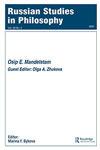鲍里斯·奇切林和卡尔·马克思。思想的交锋
IF 0.1
4区 哲学
Q4 Arts and Humanities
引用次数: 0
摘要
摘要本文分析了自由主义者鲍里斯·奇切林和社会主义者卡尔·马克思在两个基本问题上的根本对立立场,他们在这两个问题上进行了间接的争论。文章的第一部分探讨了俄罗斯农村公社的问题、它的现在和未来,以及个人在该社区中的地位和权利。奇切林认为这些公社是奴役农民的制度,是俄罗斯发展的障碍。马克思把它们看作是建设社会主义最重要的资源,看作是通过土地社会化组织农业的主要形式。文章的第二部分分析了契切林和马克思对辩证法的解释,以及这些解释如何影响他们对经济和社会现实的理解。辩证法的两种解释提供了资本主义和社会主义关于个性和个人自由的两种根本不同的画面。本文章由计算机程序翻译,如有差异,请以英文原文为准。
Boris N. Chicherin and Karl Marx. A Confrontation of Ideas
ABSTRACT This article analyzes the fundamentally opposite positions of the liberal Boris N. Chicherin and the socialist Karl Marx on two fundamental issues where they engaged in polemics, albeit indirectly. The first part of the article examines the issue of the Russian rural commune, its present and future, and the place and rights of individuals in that community. Chicherin saw these communes as an institution of peasant enslavement and an obstacle to Russia’s development. Marx saw them as the most important resource for building socialism, as the main form of organizing agriculture via socialized land. The second part of the article analyzes Chicherin’s and Marx’s interpretations of dialectics and how these interpretations influenced their understandings of economic and social reality. The two interpretations of dialectics provide two fundamentally different pictures of capitalism and socialism, on individuality and personal freedom.
求助全文
通过发布文献求助,成功后即可免费获取论文全文。
去求助
来源期刊

RUSSIAN STUDIES IN PHILOSOPHY
PHILOSOPHY-
CiteScore
0.10
自引率
0.00%
发文量
14
期刊介绍:
Russian Studies in Philosophy publishes thematic issues featuring selected scholarly papers from conferences and joint research projects as well as from the leading Russian-language journals in philosophy. Thematic coverage ranges over significant theoretical topics as well as topics in the history of philosophy, both European and Russian, including issues focused on institutions, schools, and figures such as Bakhtin, Fedorov, Leontev, Losev, Rozanov, Solovev, and Zinovev.
 求助内容:
求助内容: 应助结果提醒方式:
应助结果提醒方式:


